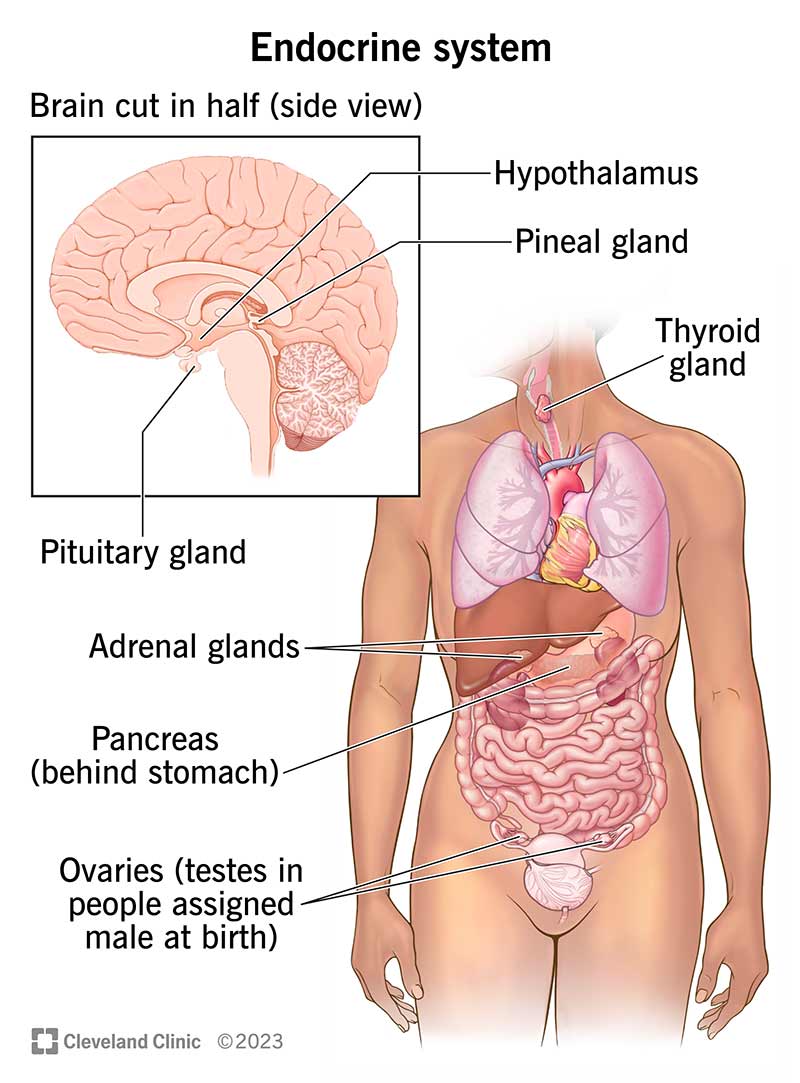Your endocrine system is in charge of creating and releasing hormones to maintain countless bodily functions. Endocrine tissues include your pituitary gland, thyroid, pancreas and others. There are several conditions related to endocrine system issues — usually due to a hormone imbalance or problems directly affecting the tissue.

Your endocrine system consists of the tissues (mainly glands) that create and release hormones.
Hormones are chemicals that coordinate different functions in your body by carrying messages through your blood to your organs, skin, muscles and other tissues. These signals tell your body what to do and when to do it. Hormones are essential for life and your health.
Advertisement
Cleveland Clinic is a non-profit academic medical center. Advertising on our site helps support our mission. We do not endorse non-Cleveland Clinic products or services. Policy
The main function of your endocrine system is to release hormones into your blood while continuously monitoring the levels. Hormones deliver their messages by locking into the cells they target so they can relay the message. You have more than 50 different hormones, and they affect nearly all aspects of your health — directly or indirectly. Some examples include:
Very small amounts of hormones can trigger significant responses and changes in your body. If your body has too little or too much of a hormone, it affects your health. This often causes noticeable symptoms.
Your endocrine system consists of three types of tissues:
Glands are special tissues in your body that create and release substances. Endocrine glands make and release hormones directly into your bloodstream. The endocrine glands in your body from head to toe include:
You have other glands in your body that aren’t endocrine glands, such as sweat glands (a type of exocrine gland).
Certain organs in your body also make and release hormones. An organ is a group of tissues that form a structure that performs specific important functions in your body. The organs that are part of your endocrine system include:
Other tissues in your body release hormones. But we don’t typically think of them as endocrine system tissues because they have other, more significant functions or roles. They include:
Advertisement
There are hundreds of conditions related to issues with your endocrine system. Hormonal imbalances make up a significant number of endocrine diseases. This typically means there’s too much or not enough of one or more hormones. But issues directly affecting endocrine system glands and organs, like benign and cancerous tumors, also account for endocrine diseases.
The below groupings cover some — but certainly not all — endocrine system-related conditions.
Diabetes and metabolic conditions:
Endocrine cancers and tumors:
Sexual development, function and reproduction conditions:
Calcium and bone conditions:
An endocrinologist is a healthcare provider who specializes in the endocrine system and conditions related to your hormones. They can diagnose endocrine conditions, develop treatment and management plans, and prescribe medication. Pediatric endocrinologists specialize in conditions that affect children under 18.
Some endocrine conditions may require more than one provider. For example, care for cancer affecting endocrine tissues would also involve oncologists and other cancer specialists.
Advertisement
It’s not possible to prevent all types of endocrine system-related conditions, like those that have autoimmune causes. But there are some steps you can take to try and keep your endocrine system healthy, including:
Chemicals called endocrine disrupters can also affect your endocrine system. These chemicals are in many everyday products, including some:
You can’t completely avoid contact with endocrine-disrupting chemicals (EDCs). But you can make informed choices to reduce your exposure to them and your risk of any potential health effects.
Lastly, if you have a family history of endocrine system-related conditions, like diabetes or thyroid disease, talk to your healthcare provider. They can help you understand your risk of developing the condition and let you know what symptoms to look out for.
A note from Cleveland Clinic
Your endocrine system is vital to your existence. While normally, your body carefully balances its hormones, having too little or too much of a certain hormone can lead to health problems. If you’re experiencing any concerning symptoms, it’s important to talk to your healthcare provider. They’re available to help.
Last reviewed on 11/22/2023.
Learn more about the Health Library and our editorial process.
Advertisement
Cleveland Clinic is a non-profit academic medical center. Advertising on our site helps support our mission. We do not endorse non-Cleveland Clinic products or services. Policy